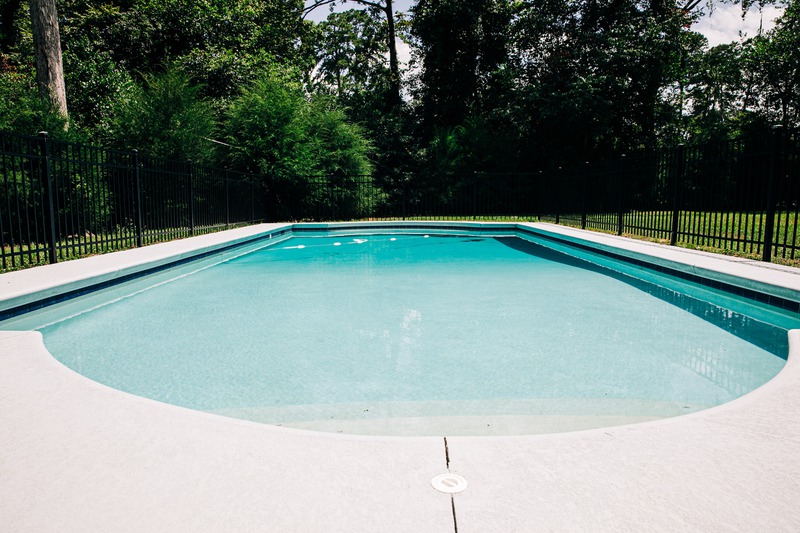When you’re planning to build a swimming pool, choosing the right material is paramount. It not only affects the aesthetics and feel of your pool but significantly impacts its durability and maintenance down the line. So, let’s explore what materials you should be considering to make your pool a timeless oasis.
Concrete Pools
Concrete pools have long been a favorite for many pool owners, and for good reason. These pools are known for their durability and customization possibilities. You can shape them into almost any form you desire, providing a bespoke touch to your backyard oasis.
Benefits of Concrete Pools
-
Strength and Stability: Concrete pools are sturdy and can withstand significant wear and tear. This makes them ideal for those looking for a long-lasting solution.
-
Customizable Designs: The material allows for a wide range of shapes, sizes, and finishes, giving you plenty of room for creativity.
-
Resale Value: A well-built concrete pool can add substantial value to your property.
Vinyl Pools
Vinyl pools are another popular option among homeowners due to their affordability and ease of installation. These pools consist of a frame and a flexible liner that holds the water, allowing for quicker and less expensive installation.
Advantages of Vinyl Pools
-
Lower Initial Cost: Vinyl pools are generally less expensive to install than concrete ones, making them a practical choice for those on a budget.
-
Soft to the Touch: The vinyl surface is smooth, reducing the risk of scrapes and injuries.
-
Low Maintenance: Algae are less likely to adhere to the smooth surface, simplifying cleaning and maintenance.
Fiberglass Pools
This type of pool is gaining popularity due to its easy maintenance and quick installation time. Fiberglass pools come pre-molded, and are delivered to the site ready to be placed in the ground.
Fiberglass Pool Benefits
-
Quick Installation: Since they’re pre-manufactured, fiberglass pools can be installed faster than any other type of pool.
-
Durable Surface: The non-porous surface of fiberglass is resistant to algae and bacteria.
-
Flexibility: The material’s flexibility allows it to withstand minor ground shifts.
Natural Pools
If you’re someone who enjoys a more organic approach to pool design, natural pools might be your perfect match. These pools use natural materials and systems to create a swimming experience that feels as though you’re swimming in a lake or pond.
Perks of Natural Pools
-
Eco-Friendly: Natural pools use plants for filtration, eliminating the need for chemicals.
-
Aesthetic Appeal: They integrate well with the natural landscape, offering a unique and picturesque swimming experience.
-
Low Chemical Use: The balanced ecosystems in natural pools require minimal chemicals.
Choosing the Right Pool Material for Your Climate
When considering which material to use, it’s crucial to factor in the climate of your area. It plays a huge role in the longevity and maintenance of your pool.
Cold Climates
For areas with cold, harsh winters, like in the northern parts of the country, concrete pools fare well due to their robustness. Fiberglass can also handle the freeze-thaw cycle, thanks to its flexibility.
Warm Climates
In warmer areas where the pool sees consistent use, both concrete and vinyl pools perform well. However, natural pools are becoming increasingly popular due to their environmentally friendly properties and reduced reliance on chemical processes, ensuring pleasant usage during the warmer months.
Importance of Pool Flooring
Just as important as the walls of your pool, the flooring material is another critical component in ensuring long-lasting durability. Considering factors like slip resistance, comfort, and maintenance can significantly impact your swimming pool’s longevity.
Ceramic Tiles
Ceramic tiles are often used for pool flooring due to their durability and resistance to wear. Although they can be a bit pricier, their aesthetic appeal can be worth the investment.
Pebble Finishes
Pebble finishes provide a naturally textured look, are slip-resistant, and are known for their durability. They’re excellent for creating a naturalistic aesthetic while ensuring the safety of those walking or swimming in the pool.
Considering the Surrounding Environment
When planning your pool, it’s not just the material of the pool itself that matters. The surroundings are equally vital. Elements such as decking can impact the overall experience and maintenance of your swimming area.
Wood Decking
Wood gives a classic, warm touch but might require more maintenance compared to synthetic options. It’s essential to choose quality, treated wood to protect against rot and insects.
Composite Decking
-
Low Maintenance: Composite materials require less upkeep, offering more leisure time to enjoy your pool.
-
Durability: This option can withstand the wear and tear of high foot traffic and pool chemicals.
A nice bonus of composite decking is its resistance to splinters, which enhances safety, especially for children.
How to Protect Your Pool Investment
Once you’ve settled on the materials, maintaining them is the next step to ensure they last as long as possible. Regular maintenance routines like cleaning, checking pH levels, and servicing equipment are essential.
Prioritize hiring swimming pool services in Bedford to help maintain the pool in top shape. Investing in the right kind of pool cleaner or automatic cleaner can save you time and effort.
The Role of Pool Covers in Durability
Pool covers are an often overlooked component but play a crucial role in prolonging the lifespan of your pool. They protect against debris, reduce evaporation, and help maintain water temperature.
Types of Pool Covers
-
Solar Covers: Utilizing the sun’s energy, these covers can help heat your pool naturally, reducing reliance on external heating sources.
-
Winter Covers: Made for colder months, these heavy-duty covers protect the pool from freezing temperatures and debris.
-
Safety Covers: Designed for durability, these covers can prevent accidental falls into the pool.
If you’re considering swimming pool installation in NH, it would be a smart choice to also invest in a reliable pool cover tailored to your specific needs, considering the local weather conditions.
Choosing Quality Over Cost
While it might be tempting to cut costs by choosing cheaper materials, investing in high-quality materials will pay off in the long run — both in terms of reduced maintenance and increased lifespan of your pool.
The cost difference is often justified by the long-term benefits, as higher quality materials are generally more resistant to wear and tear, and provide a more aesthetically pleasing look.
Also, combining materials smartly is key, such as using durable material on the pool walls and a comfortable, aesthetic option for the flooring. Some opt for additional accessories, such as a pool heater filter, to maximize their pool’s function and lifespan.
Final Thoughts
Choosing the right pool materials is no small task. Whether you go for the durability of concrete, the affordability of vinyl, or the low-maintenance allure of fiberglass, each material offers something unique. Pay attention to your area’s climate, your budget, and most importantly, your personal preferences. With proper planning and maintenance, your pool can become a central part of your outdoor living space for many years to come.




